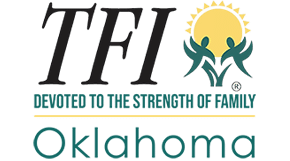TFI is a private not-for-profit 501(c)(3) organization providing foster care services and care for the children and families in Kansas, Nebraska, Oklahoma, Texas.
Please visit each state page for additional social media links.
In Oklahoma, there are over 9,000 children placed into out of home placement. There are less than 2,000 foster homes. This disparity means that children from your community are being placed outside of their home community, or in shelters.
Children who are placed outside their home community in one day lose their parents, family, school friends, teachers, coaches, and sense of connection to their community. They frequently miss school so they can have visits, or they don’t see family because they need to be in school. This sense of loss is compounded when they cannot be placed with their brothers and sisters due to no one having enough room.
Foster parents are needed to take children of all ages. While 76% of children in care are under the age of 10, the hardest to find placement for are teenagers.
Foster parents who are willing to take sibling sets of 3 or more are greatly needed. Oklahoma needs over 400 families willing to take large sibling groups, according to DHS.

